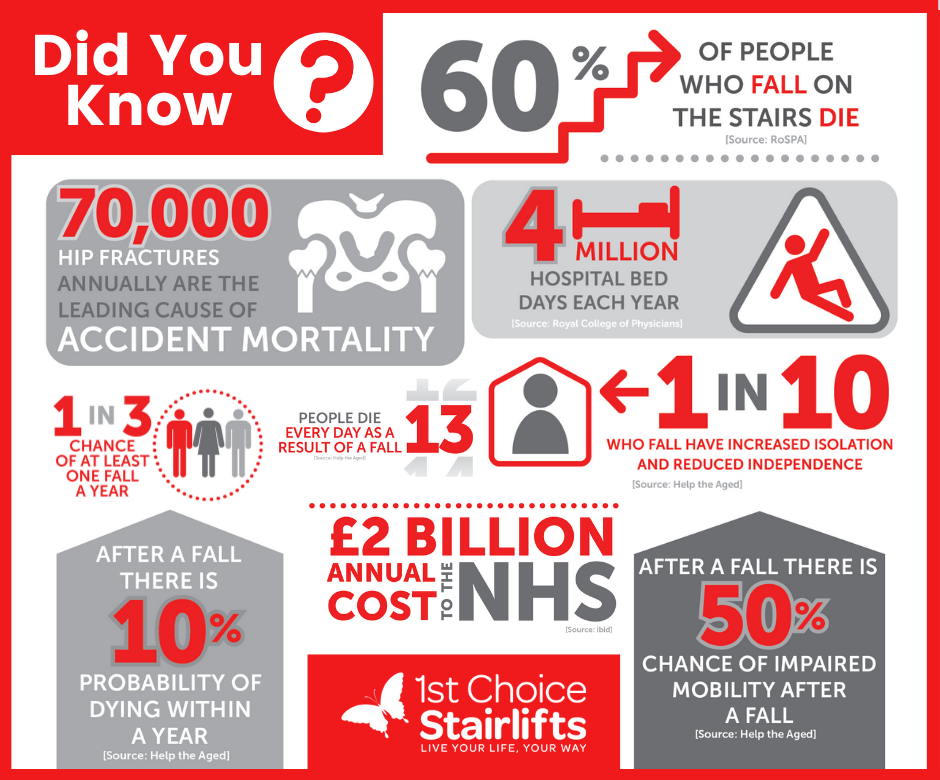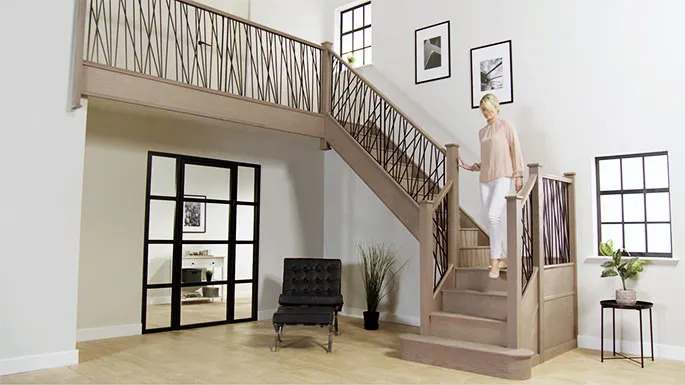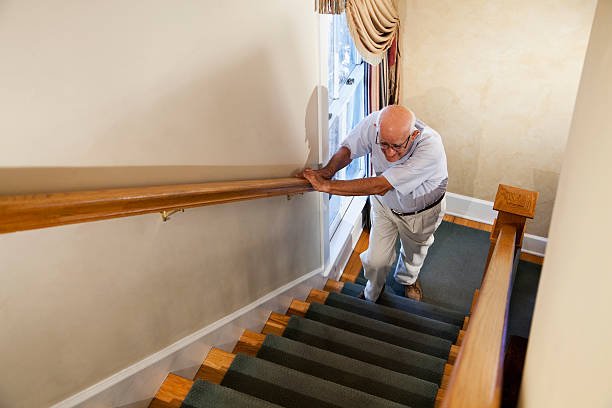Having a stair lift fitted is a big investment. It’s understandable that you may be unsure as to whether you need a lift or not. It’s estimated that we take around 250,000 journeys up and down our stairs in our lifetime, so it’s perhaps inevitable that over time, we might start to experience difficulty climbing the stairs as we get older.
From our experience, we have a lot of people say, “I wish I had a stair lift fitted sooner”. On many occasions, we’ve dealt with customers who are buying a lift for their parent as they worry for their safety and wellbeing. The parent on the other hand, believes a stair lift is a reflection of reduced independence. In fact, the opposite is true. A stair lift allows people to gain independence whilst reducing the risk of injury in the home.
The Pandemic and Mobility
A study by Age UK in May 2021 found that many people have had their health affected by the pandemic, with 1.2 million people now claiming that they are struggling to climb the stairs more than they did before the pandemic hit. Alongside this, 1.6 million are now claiming that they are struggling with stairs now even though they weren’t before March 2020. There are potentially multiple causes of newly reduced mobility, which is not limited to the effects of catching Coronavirus. Due to lockdowns, and the vulnerable being advised to isolate, people were spending more time at home and in turn had reduced hours of physical activity. On top of this, as people age, they tend to lose muscle strength and bone density which reduces flexibility. People may also have problems with balance and vision, depending on health conditions.

In our experience, one of the reasons why people are weary of having a stairlift installed is the belief that a staircase is a beneficial form of exercise. While this could appear to be sound logic, especially for those who may be more confined to their homes, this is not the case. A beneficial form of exercise for those in older age are ones that pose little risk while still increasing the heartrate, such a pilates or water aerobics. A staircase in essence, is an accident waiting to happen among those with reduced mobility.
How do you know when it’s the right time to have a lift? We’d like to share with you what we’ve learned from our customers. Here are the reasons people made the decision to get a stairlift installed.
Avoiding Falls on your Stairs
Concerningly, the RSPA (Royal Society for the Prevention of Accidents) reported that over 65s are the most at risk group suffering the highest mortality rate and severe injuries from falls. Some falls could lead to a head injury, broken or fractured bones, bruising and cuts that may need hospital treatment and in some cases even long stays in hospital with many months of rehabilitation. If you’re currently awaiting approval for a Disabilities Funding Grant or perhaps you’re not sure that you’re ready for a stairlift, we have some advice for you to avoid falls on your stairs.
- Ensure you stairs are well lit. Too often we attend homes where people don’t have any lighting on their stairs, this can cause a massive risk as you may be unable to differentiate between steps and could lead to a fall.
- Fasten loose rugs and carpets. Major trip hazards like these can easily be avoided by removing rugs altogether and fastening down any loose carpet you may find, or perhaps replacing the carpet if necessary.
- Clear the clutter. Make sure your stairs are free from any objects lying on the stairs as these can be a potential trip hazard.

Top 10 Signs you need a Stairlift
1) Being frightened of falling when going up or down stairs
Did you know statistically (according to the Royal Society for the Prevention of Accidents) you’re more likely to have a fall on your stairs than anywhere else in your home? Falls are more likely to result in hospital stays and months of rehabilitation. Unfortunately there are some people who aren’t strong enough to recover from a fall at all. This can result in going into a care home on a permanent basis or could sadly result in someone passing away.
2) You’re helping someone else upstairs, by walking behind them
Probably the most scary thing we see! What happens if you are a carer for your loved one and you topple down the stairs by helping them like this? It can be an accident waiting to happen. What if you are hurt and it results in a hospital stay where you’re no longer able to care for your loved one? It’s really not a good idea for both of you. A stairlift can make both your lives easier, help give your loved one their independence back and free up your time too.
3) You’re shuffling up and/or down on your bottom
There are much easier ways of getting up and downstairs that don’t resort in your bum having to do all the hard work! Why do the hard work yourself when a stairlift can do it for you?
4) You pull yourself up the stairs using a bannister or handrail
Sometimes people have extra handrails fitted to help them up the stairs, they are used for balance. If you find that you are hauling yourself up using the rail, that’s not what they are designed for. Think of the strain it is putting on your shoulders, neck and back which may affect your health. A stairlift puts no pressure on your body or joints whatsoever.

5) It takes you over 5 minutes to climb your stairs
We’re sure in your younger days you would run up the stairs, perhaps even taking them two at a time. We take on average 250,000 journeys up and down stairs in our lifetime, it’s not surprising we slow down as we age. Sometimes it’s necessary to get up and downstairs quickly perhaps to use the bathroom or just nip upstairs for something. The average stairlift takes 35 seconds (yes that’s right just 35 seconds) to get you upstairs.
6) You’re out of breath or dizzy when you get to the top of the stairs
If this is you, climbing the stairs may feel like climbing Mount Everest. If climbing the stairs is causing problems with your health, you should consider getting a stairlift installed.
7) You have problems seeing the steps and judging putting your foot on them correctly
Sometimes certain conditions make people misjudge steps such as Parkinsons, Alzheimers, visual impairments, Osteporosis and so on. It’s crucial to avoid accidents happening in the home. It’s easier for you to sit on a lift and safely get off it at the top of the stairs rather than misjudging a step and falling.
8) A change in mobility and not being able to do climb the stairs like you used to
Sometimes there can be a gradual or sudden change in mobility that makes climbing stairs harder or even impossible. A stairlift can be fitted quickly to help you to regain your independence and use of your whole home.
9) Discharged from hospital
If you’ve just been discharged from hospital, you might want to think about having a stairlift fitted. Sometimes you’re not up to full strength and if you’re likely to get better you could consider a rental stairlift to help you temporarily whilst you recuperate. If your condition is unlikely to change, you can buy your lift at a later date to keep it permanently.
10) Your family are worried about you on the stairs
Being “told off” by your kids, family or friends for struggling on the stairs? They’re only saying it because they care about you and your welfare. A stairlift genuinely does make a difference to your quality of life. It allows you to have freedom and independence in the home you love. Also, a recent study found that having mobility aids like a stairlift, can prolong care home admission for an average of 4 years.
Don’t wish you had a stairlift fitted sooner. If the time is now, give us a call for a free no-obligation quotation. We can find out if a stairlift is suitable for you and your stairs. Then we are able to give you an accurate price, with no high pressure selling, just expert friendly advice.
For further information advice or a free home visit call us on 08000 19 22 10.
You can also book a stairlift test drive in our showroom.










